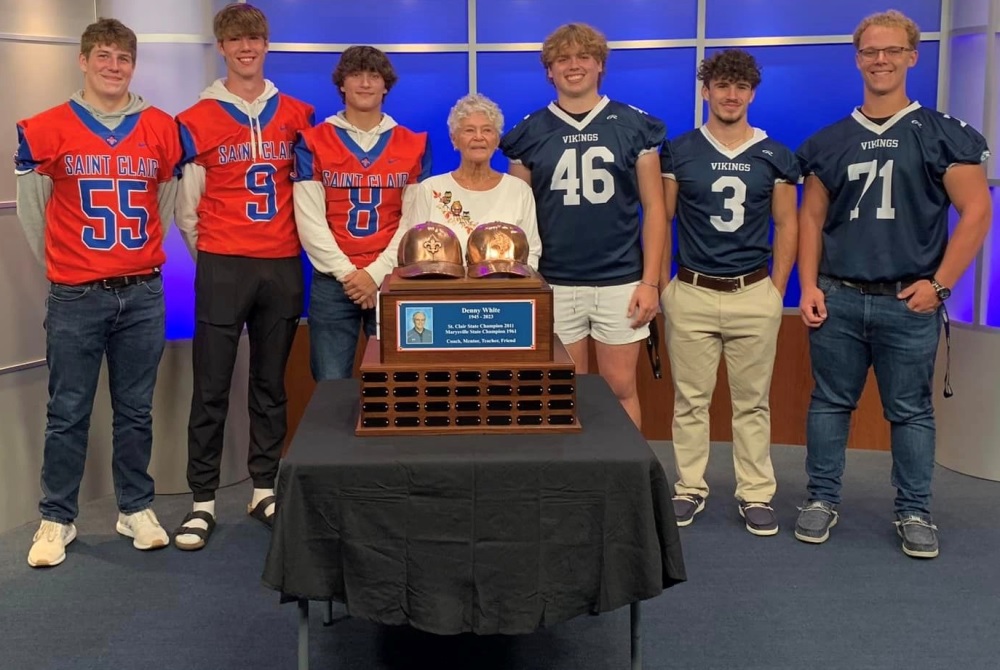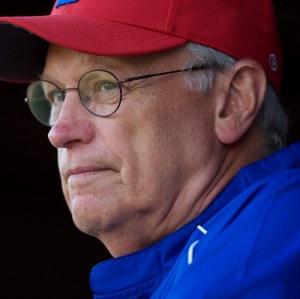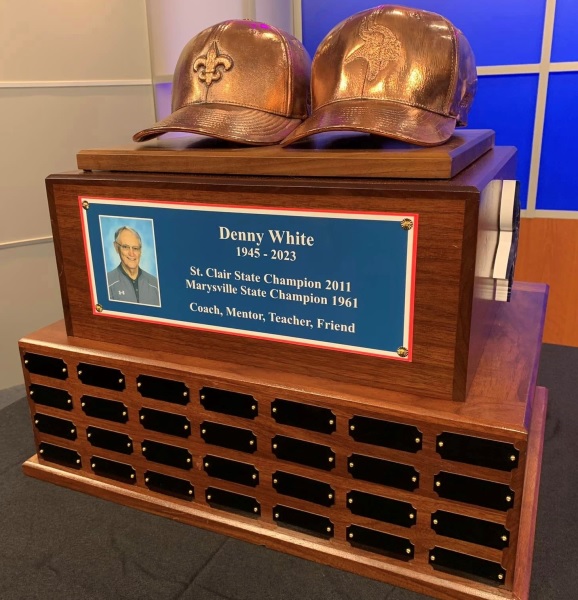
CAP Begins 2014-15 on Record Pace
By
Geoff Kimmerly
MHSAA.com senior editor
August 22, 2014
Gretchen Mohney has come to recognize coaches who think they already know it all.
Then she begins a Coaches Advancement Program lesson by describing an orange banging around inside a fishbowl – a metaphor to explain the brain inside an athlete’s skull when he or she suffers a concussion.
Her most powerful lessons have moved pupils to tears. And it’s always gratifying to witness the “Aha” moments that make the CAP educational experience so powerful.
“My favorite is when they admit that they’ve done something wrong, and they want to know how to do something better,” said Mohney, a highly-respected trainer and strength and conditioning coach who also serves as an instructor for the athletic training program at Western Michigan University. “It’s a pretty awesome moment when they realize there’s more to learn.”
More current and aspiring coaches than ever before are taking advantage of that opportunity as the 2014-15 school year kicks off.
Since this training year began July 25 at Battle Creek Lakeview, 273 current or aspiring coaches have completed CAP sessions – nearly twice as many coaches as this point a year ago and with the last session of August planned for Saturday at New Buffalo. That makes this the busiest start in CAP history, according to MHSAA assistant director Kathy Vruggink Westdorp, who joined the MHSAA staff in 2004, developed CAP for the 2004-05 school year and continues to oversee the program.
This first month’s total attendance also represents 33 percent of the 818 total CAP units completed at high schools and the MHSAA office during all of 2013-14.
“I think the big thing continues to be word of mouth that this is a quality program,” said Hamilton athletic director Jerry Haggerty, a CAP instructor for nine years. “It’s good for all coaches of all experience levels.”
Setting a standard
Since the program’s inception, nearly 6,300 coaches have completed at least the first-level unit. More than 1,000 have advanced through CAP 4.
The CAP program is broken into six levels, each addressing a set of topics:
- CAP 1: Coaches Make the Difference, The Coach as Teacher, Sports Medicine and First Aid.
- CAP 2: Effective Communication, Legal Responsibilities, Psychology of Coaching.
- CAP 3: Additional Coaching Responsibilities, Effectively Working with Parents, The Coach as Performer.
- CAP 4: Understanding Athletic Development, Strength and Conditioning, Preparing for Success.
- CAP 5: Healthy Living, Teaching Emotional Toughness, Resolving Conflicts in Athletics.
- CAP 6: Current Issues and Topics in Educational Athletics.
“Individuals who go through this have a better understanding of their philosophy, their school’s philosophy, their role and responsibility as well as the meaning behind MHSAA rules,” said Westdorp, a former principal, athletic director, teacher and coach in the Grand Rapids area who was named 2013 Coach Educator of the Year by the National Federation of State High School Associations (NFHS) for her work with the program.
She trains and evaluates all presenters and instructors, including those who last school year administered 1,238 CAP sessions at seven universities and colleges across both peninsulas.
The non-college CAP sessions are taught by 20 instructors who pride themselves on being available anywhere there’s interest. CAP has been presented at 10 Lower Peninsula schools over the last month, with Upper Peninsula sessions planned for this fall. August 9 was particularly busy – units were taught at Jonesville, Pontiac Notre Dame Prep and Riverview Gabriel Richard – but Westdorp sees the possibility of presenting at up to five sites on the same day.
Flexibility also is an option; a group of mostly non-school coaches took CAP 2 last week in Baldwin, and were able to complete the course over two days instead of one so they could do so without interrupting their fulltime jobs. For coaches working in schools, CAP units can qualify as continuing education credits with the State Department of Education.
Colleges and universities in Michigan are licensed to present up to five levels through their undergraduate or graduate studies, and the list of those who completed courses the last few years is filled with recognizable names of former high achievers on MHSAA courts and fields. Southwestern Michigan College in Dowagiac will offer courses for the first time this fall.
Certification in the program occurs after completion of CAP 1 and 2, and then after each subsequent unit, with those completing CAP 6 earning Masters Elite Certification.
The topics of CAP sessions “bleed” into each other, Mohney said, and come with plenty of first-person examples to make them relevant to coaches who then realize they aren’t alone facing issues most encounter.
“I talk to them because I’ve been there. … (I say,) ‘Now, let’s talk real.’ I place them in a real situation,” Mohney said. “’The biggest thing is you guys don’t have to know everything. You just need to coach, be aware of this, this and that. And these are some ideas to go about your plan so you can decrease your stress.’
“Any time a coach hears that, it’s a beautiful thing. Because I’m not sure what coach in high school is in coaching for the money.”
Raising the bar
Certainly, some of this month’s heightened CAP participation can be attributed to an MHSAA Representative Council action in March. Beginning Aug. 1, 2016, varsity head coaches hired for the first time at an MHSAA member school must have completed CAP 1 or CAP 2. Westdorp said some who wish to become head coaches in that near future are getting a jump by completing CAP courses now.
But that’s only a slice of the success story.
Haggerty has directed Hamilton’s athletic department for 15 years and said all of his coaches have taken either CAP 1 or 2. Many coaches take the courses on their own; others are required to do so by their athletic directors.
The Capital Area Activities Conference will offer CAP 1 three times this school year, with 100-150 coaches from their 20 member schools expected for each session. Others leagues and conferences are designing similar arrangements.
Michael Roy coached boys basketball at Lawton and girls hoops at Vicksburg and was certified under the predecessor to CAP – the MHSAA’s former Program for Athletic Coaches’ Education (PACE). He’s beginning his 13th year as Vicksburg’s athletic director, and after hosting several CAP classes over the years decided to begin the program himself this month.
“The need for knowledgeable and experienced coaches is greater than ever before. I thought if I was going to make it mandatory for my coaches to become CAP certified, that I needed to get CAP certified and lead by example,” Roy said. “The heart of any athletic team or program is its coaching staff. CAP is the surest way for coaches to access everything they need to know how to be a good coach. They learn the art of effective coaching through one of the best-designed coaches education programs in the country. CAP is second to none.”
Haggerty has spoken with athletic directors who have completed the program and then recognize when their coaches employ strategies learned at CAP sessions. An increasing pool of coaching candidates are heading into interviews with CAP certification in hand, and Westdorp has seen coaches bringing their CAP binders to practices to have those lessons available for quick reference. She’s also watched many CAP graduates using their skills at the highest level – the MHSAA Finals.
A comment by Duke men’s basketball coach Mike Krzyzewski sits at the front of those CAP binders: “A common mistake among those who work in sport is spending a disproportional amount of time on x’s and o’s as compared to time spent learning about people.”
Haggerty starts each session telling his pupils, “I do this for two reasons; one because I think it’s important to look at the non-x and o coaching realms; and two, because this is great fun for me.’”
And those coaches who come into CAP thinking they know enough? Mohney said most finish the first unit looking forward to beginning the next.
“CAP has a lot to do with understanding what you’re about, understanding your role and responsibility in athletics and your leadership role,” Westdorp said. “When I start programs, I talk about my work roles in life, and then (I tell coaches), ‘I want to tell you where I felt I was more influential, and that was as a coach.
“’And don’t ever forget it..’”
Click for more on the Coaches Advancement Program.
PHOTOS: These coaches, counter-clockwise from top left, all have completed at least one CAP unit: Bay City Western softball coach Rick Garlinghouse, St. Ignace girls basketball coach Dorene Ingalls, Ypsilanti Community boys basketball coach Steve Brooks, Beal City baseball coach Brad Antcliff and Mattawan softball coach Alicia Smith.

Marysville, St. Clair Join Together to Honor Beloved Coach with Rivalry Trophy
By
Paul Costanzo
Special for MHSAA.com
October 11, 2023
Denny White brought quite a bit to the Marysville and St. Clair communities.
 In 1961, as a junior in high school, White was part of the first team to bring a football state title to Marysville.
In 1961, as a junior in high school, White was part of the first team to bring a football state title to Marysville.
Fifty years later, as an assistant coach, he played a vital role in bringing St. Clair its first MHSAA Finals title in baseball.
During the years in between, and decade after, White brought his knowledge of and passion for those sports to hundreds of student athletes.
But most recently, he brought the two communities together.
This past Friday night, the rival schools played for the Denny White Trophy, an award created to honor the late coach and connect the two communities where he was most revered.
“I’m so happy with all the support that has been around the project,” said Brady Beedon, a family friend who helped to create the trophy and was in the booth calling Friday night’s game for Get Stuck On Sports. “It’s the least we could’ve done for a man who helped so many athletes. His legacy deserves to be preserved.”
In a fitting tribute to White, who died Jan. 22 of this year following a long battle with cancer, the two teams played a hard-fought game at East China Stadium, with White’s alma mater Marysville coming away with a 25-20 victory.
Both teams featured players who had been coached by White at some point in one or both of the sports, as his time on the bench lasted through the fall of 2022.
 That season, he coached the JV B football team at Marysville. Most recently before that, he had been the varsity baseball coach at St. Clair from 2015-21.
That season, he coached the JV B football team at Marysville. Most recently before that, he had been the varsity baseball coach at St. Clair from 2015-21.
“Not much can unify rivals, but Coach White’s influence goes beyond that rivalry,” Marysville football coach Derrick Meier said at a press conference unveiling the trophy. “He’s affected thousands of local athletes. … It is awesome that someone had such an influence across the board with all local athletes (in multiple) sports. I contacted him my first year coaching varsity, and he was not willing to leave where he was at. I called him three subsequent years; he graciously declined. The last year he did accept, we added a JV B team, his wisdom and knowledge went well beyond just coaching on the field. We’re all lucky for his influence.
“Heroes get remembered. Coach White will be remembered.”
White was a 1963 graduate of Marysville, who then attended Ferris State and Central Michigan. His coaching journey did not begin in the area where he grew up, however, as he coached baseball and football at Newaygo High School before coming to St. Clair.
He spent 35 years in the Saints athletic program, coaching baseball and multiple levels of football.
Much of his time was spent as the pitching coach for St. Clair for coaches Richie Mallewitz and Bill McElreath. That included the 2011 season, when his pitching staff included current major leaguer Jacob Cronenworth, who now plays second base for the San Diego Padres.
Also on that staff were Joel Seddon, who was drafted twice – once out of high school and again after college – and would go on to be the closer at South Carolina; and Jared Tobey, who pitched at Wayne State and was drafted by the Detroit Tigers, playing four years in their minor league system.
While White coached nearly 1,000 baseball games in his career, he was involved with more than just high school sports. He also coached a 13-year-old Little League team to a state title and the semifinals of the Great Lakes Regional in 2015.
 No matter the level, White poured all he had into coaching, and that included his final season on the sidelines at Marysville, just months prior to his passing.
No matter the level, White poured all he had into coaching, and that included his final season on the sidelines at Marysville, just months prior to his passing.
“Every single kid that he touched with that team, you could just tell, gravitated toward him immediately,” said Travis Disser, who coached with White that final year at Marysville. “His lessons and his light-hearted humor are just something that you can’t replace, or ever hope to. I was lucky enough to learn pitching from Coach White when I was a younger kid, as well. He was the exact same Denny White as he was all those years ago, as he was last year during his battle with cancer. Coach White was a warrior in every sense of the term. His lessons, both on the field and off the field from him, are something that I’ll never, ever forget.”
The idea to create the trophy honoring White came about not long after his death, as Beedon worked with Meier, former St. Clair athletic director Denny Borse and St. Clair assistant football coach T.J. Schindler to create and design the trophy.
The final product is a two-tiered trophy topped with a pair White’s hats – one from St. Clair, the other from Marysville – that have been bronzed. It includes the years in which he won his state titles at his respective schools, and a passage about his life. There is also room to list the yearly winners, as it is planned to represent the rivalry and shared respect for White in the two communities for years to come.
“Whether it was Little League kids over the last 20 years, or some of the football players and baseball players that he coached over the decades that he coached, all of them when they get together have great stories and fondness for all the memories that (White and his fellow coaches) helped them create,” said Sandy Rutledge, the current St. Clair athletic director and a longtime friend and colleague of White. “I think it’s awesome that now as we play for this trophy every year, it will give our coaches a chance to kind of explain who Coach was. The next generation, maybe they didn’t even know him, will know that he is a legend, and he’ll always be remembered.”
 Paul Costanzo served as a sportswriter at The Port Huron Times Herald from 2006-15, including three years as lead sportswriter, and prior to that as sports editor at the Hillsdale Daily News from 2005-06. He can be reached at [email protected] with story ideas for Genesee, Lapeer, St. Clair, Sanilac, Huron, Tuscola, Saginaw, Bay, Arenac, Midland and Gladwin counties.
Paul Costanzo served as a sportswriter at The Port Huron Times Herald from 2006-15, including three years as lead sportswriter, and prior to that as sports editor at the Hillsdale Daily News from 2005-06. He can be reached at [email protected] with story ideas for Genesee, Lapeer, St. Clair, Sanilac, Huron, Tuscola, Saginaw, Bay, Arenac, Midland and Gladwin counties.
PHOTOS (Top) From left: St. Clair’s Larry Wawryzniak, Liam Nesbitt and Peyton Ellis, Denny White’s wife Karen White, and Marysville’s Bryce Smith, Carter Saccucci and Caz Carty stand with the first-year traveling trophy celebrating Denny White’s coaching career. (Middle) White was a mainstay in the area’s sports community for more than six decades. (Below) The trophy celebrates his contributions to both schools and will list the winners of their annual football game. (Trophy photos courtesy of Brady Beedon. Headshot courtesy of the White family.)

